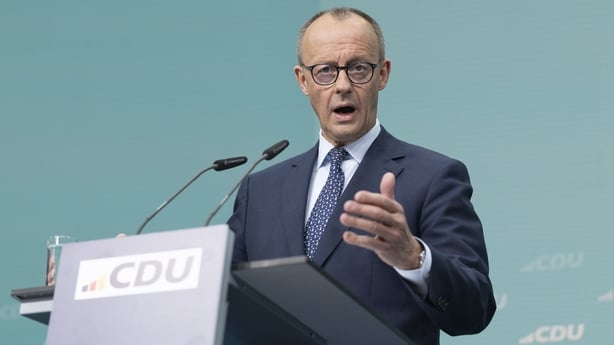Germany's likely next chancellor Friedrich Merz has said his centre-right CDU/CSU and the centre-left Social Democrats (SPD) would propose hundreds of billions in extra spending on defence and the economy.
Mr Merz told a press conference that the two parties would "in the next week" bring proposals to parliament for "a special fund in the size of €500 billion for the next 10 years" for economic development, and also to exempt more defence spending from Germany's constitutionally enshrined "debt brake".
The proposal would mean that there would be no limit to debt taken out for defence above an amount corresponding to 1% of GDP - €45bn when applied to the current size of Germany's economy.
The CDU/CSU came first in last month's general elections and quickly entered negotiations with the SPD towards forming a coalition government.
The talks have been given new urgency by the Trump administration's clash with Ukrainian President Volodymyr Zelensky and the freezing of US military aid to Ukraine.
Mr Merz also said he wants to get immediate approval for a €3 billion aid package for Ukraine which has been held up for weeks.
Mr Merz said he would meet outgoing Chancellor Olaf Scholz tomorrow "to speak about the urgent help needed for Ukraine, around €3bn or €3.5bn, which... can be approved now as off-budget expenditure".
Germany's conservatives have also argued that the country should quickly reintroduce compulsory military service.
Mr Merz said that in the era of US President Donald Trump, Europe will have to better handle its own security.
The defence policy spokesman of his centre-right alliance, Florian Hahn, told Bild daily that Germany's "suspension of conscription no longer fits the current threat situation".
"The first conscripts will have to walk through the barracks gates in 2025," Mr Hahn told the daily.
"We cannot stand by and watch as the world around us becomes more unsafe."
Fears about the future strength of NATO have surged in Europe after Mr Trump has increasingly sided with Russia against Ukraine, upending the Western consensus of recent years.
Mr Merz has vowed to break with many policies of former CDU chancellor Angela Merkel, including on migration, but also on her 2011 decision to suspend compulsory military service.
This week, Mr Merz reiterated that he would favour the reintroduction of a compulsory year in which young people could perform either military or community service.
"We need a much higher personnel strength in the Bundeswehr (armed forces)," he said.
"I am not committing myself to any numbers now, but we cannot manage with the current number and we also need a much stronger reserve."
Read more:
Trump pauses military aid to Ukraine after Zelensky clash
'Coalition of the willing' to present US with Ukraine peace plan - Starmer
Although conscription was long highly controversial in Germany, support for bringing back some form of military service has grown across political party lines.
Defence Minister Boris Pistorius, from the SPD, has pushed the idea of building up the armed forces, though without conscription.
He has promoted a model that relies on voluntary service but also allows the country to make conscription compulsory if needed.

In a first step, the outgoing Scholz cabinet in November signed off on plans for a new model under which all 18-year-olds would be sent a questionnaire about their interest in the army and their physical condition.
All young men would be required to return the questionnaire, while for women, it will be voluntary.
A contingent of young men and women would then be invited to a selection process, and some recruited for an initial six-month stint of military service, with the option of extending.
The CDU/CSU bloc is currently in exploratory talks with the SPD towards building a coalition government, with Mr Merz eyeing an Easter deadline.
Ex-foreign minister of the Greens, Joschka Fischer, also argued that Germany must reintroduce compulsory military service.
"I was in favour of abolishing it," he told news weekly Stern.
"That was a mistake that we must reverse."
"Compulsory military service must be reintroduced. For both sexes. Without this step, we will not make any progress in protecting Europe."
